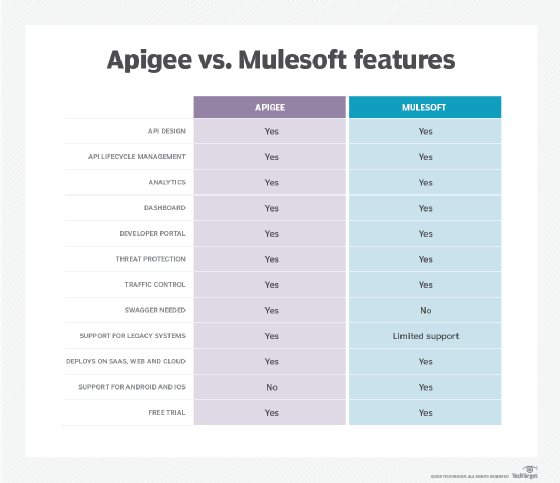
alphaspirit - Fotolia
Apigee vs. Mulesoft: An API management platform face-off
Mulesoft and Apigee are two of the most widely used API management platforms around. This article places them side by side to compare their pros and cons.
Many enterprises now implement an API management strategy, which comprises a set of practices and tools to build, manage and analyze APIs in a secure environment. API management tools also play a big role in fundamental tasks like application communication, version control, log monitoring, load balancing and data analytics.
Two of today's popular API management platforms are Apigee Edge (owned by Google) and Mulesoft Anypoint (owned by Salesforce). However, Apigee and Mulesoft offer distinctly different tooling lineups. This comparison looks at Apigee vs. Mulesoft as platform providers, examines their features and benefits and should help you understand what to consider about your needs before you settle on a provider.
Apigee vs. Mulesoft: Laying the API management groundwork
Apigee Edge, offered in both cloud-based and on-premises options, focuses on API management, development and analytics. It is particularly adept at handling peak loads on an application during runtime. Apigee supports policy definitions, threat protection, OAuth, verification of API keys and access control. The API Development portal in Apigee can be used for sharing information among the users.
You can use Apigee Edge to create API proxies, build HTTP-based RESTful APIs easily, configure API policies as needed to control traffic and error handling, and document those APIs along the way.
Apigee is easy to use with a nice interface, but it comes with a high price. And while it is not necessarily a prohibitive factor, your developers will also need a familiarity with Swagger to use this tool effectively. Finally, Apigee does not work particularly well for mobile applications -- for that, you might want to look closer at Mulesoft.

Mulesoft Anypoint
The Mulesoft Anypoint Platform, also available both in the cloud and on premises, comprises a set of tools that can build, test and manage API integrations through the use of pre-built APIs, connectors and integration assets. Built-in support for Jenkins also helps developers easily test their APIs. But keep in mind that Mulesoft provides limited support for legacy system integration. Apigee is a better choice if your priority is distributed service or legacy application integration.
The Mulesoft Anypoint Platform boasts a few unique and powerful features, such as their easy-to-use API Design Center. They also provide the Anypoint Exchange, which acts as a store for shareable and reusable application resources, and tooling aimed towards scalability, availability, reliability and security. And unlike Apigee, developers don't need to have a deep knowledge of Swagger to use the platform effectively.






